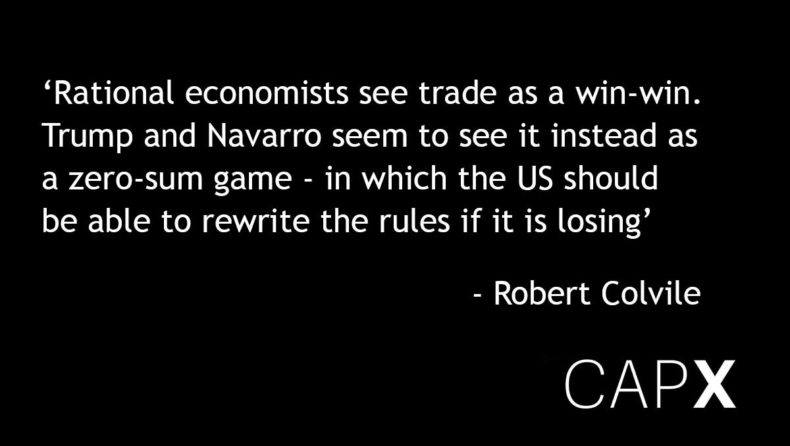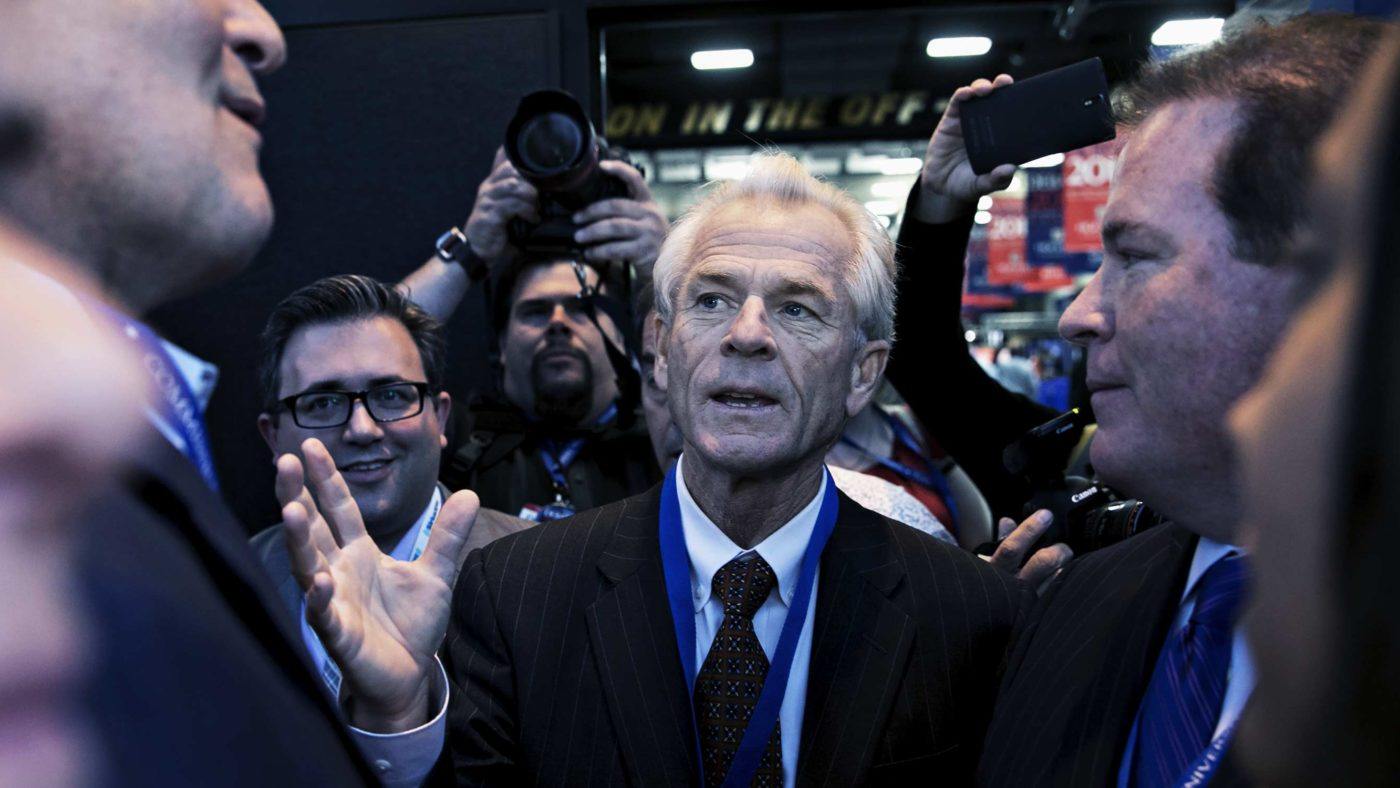Ever since his election victory, people have been arguing that Donald Trump is the most dangerous man in the world.
They’re wrong: it’s Peter Navarro.
Navarro, for those who aren’t familiar with him, is Trump’s trade guru. He’s the author of books such as Death by China, The Coming China Wars and China: Why Don’t We Just Nuke ’Em? (only one of these is made-up). He’s also been described as selling “dodgy economics”, “alarmingly ignorant”, “astoundingly ignorant”, “misguided” and “dangerous”.
Navarro’s basic idea is that countries such as China, Japan and Germany have rigged the trade system against the US. Their large export surpluses are the result of currency manipulation and other underhand tricks.
More broadly, the Navarro-Trump view is that exports are good and imports are bad. The goal of America’s trade policy should be to maximise the former and minimise the latter – that is to say, it is more important to eliminate trade deficits, whether with individual countries or the world as a whole, than it is to grow trade volumes.
The problem is that, as many, many people have pointed out, this kind of mercantilism doesn’t make sense. Yes, it’s nice to have strong exports. But imports also serve a fundamentally positive function: they make things cheaper for consumers.

While it may be damaging for particular sectors of the economy (the people making stuff that can actually be made cheaper abroad), trade is good for the economy as a whole – in fact, as Tim Worstall points out, any type of trade, even on horribly unfair terms, is axiomatically better than no trade at all. Conversely, any attempts to restrict trade are axiomatically damaging – hence the parable of Obama’s tyre tariffs, which saved 1,200 jobs at a cost to the wider economy of $1.2 billion.
Yet what’s even more alarming than Navarro’s banana economics are the measures that he and Trump are preparing to take to implement them.
Thanks to Trump and Navarro, the Trans Pacific Partnership is dead, taking with it hundreds of billions in potential economic gains. America’s proposed trade deal with the EU may follow – along with the NAFTA deal between the US, Canada and Mexico.
But it’s not just multilateral treaties. The Financial Times reports that the new White House administration is proposing to bypass the World Trade Organisation and impose its own punishments on those whose trade policies it disagrees with.
In a similar vein, Slate highlights a suggestion by Navarro to the senate finance committee that trade deals would automatically be renegotiated if the trading partner dared to run a surplus against the US. Trump has separately suggested that he should have the power to cancel any deal within 30 days.
It’s hard to imagine any single idea which could do more damage to the world economy.
Trade, you see, isn’t just about tariffs. It’s about certainty. Companies plotting their export strategies, or making investment decisions, need to have a clear idea of what the future looks like – a basic level of confidence that today’s rules will apply tomorrow.
This was the reason why many of us voted against Brexit – because the likely costs in terms of disruption to trade flows and investment appeared to outweigh the promised gains.
Yet the difference there is that Brexit was a one-off, a brief period of upheaval which would be followed by the establishment of a new, settled relationship – and if worst came to worst, there was always the lifeboat of trading under WTO rules.
What Trump and Navarro seem to be proposing, by contrast, is a world in which there are no rules – apart from “America always wins”.
Now, the difficulty of negotiating trade deals is sometimes exaggerated. Australia, for example, spent just 15 months on its FTA with the US, and most of that involved dealing with the special status of the sugar industry, or Australian ferries. But still – a deal’s a deal. Once it’s signed, businesses large and small will reorient their activity accordingly.
But not in Trump’s world. There, the rules will be what the White House makes them.
And this is why Navarro’s ideas are not just nonsensical – but hideously dangerous.
Take Britain’s trade with America. Last year, the US ran a surplus. The year before, however, it was in deficit. Since 1985, the pendulum has swung back and forth – generally but not exclusively favouring Britain.
Say Liam Fox spends three years negotiating an all-encompassing trade deal. Will it then be ripped up months later because British firms have been too efficient at exporting? Or because particular British MPs have said nasty things about Donald Trump?
Navarro’s rebuttal would presumably be that this provision should only apply to serial “cheaters” – the Chinas and Germanys of the world (though how you punish Germany but not the rest of the EU is hard to see).
But with a temperamental, tantrum-prone president like Trump in the White House, how could anyone be sure? What British firm would invest millions in expanding its US supply chain, or vice versa, if they knew the barriers could clang shut at any point?
For rational economists, the most important figure when it comes to trade is its volume. In terms of the US and UK, for example, even as the pluses and minuses have shifted on the ledger, the level of economic interconnection has grown and grown. America’s exports to Britain are now five times larger in nominal terms than they were in 1985, making them more than twice as large in real terms. That’s something from which both countries, and their consumers, have benefited.
But for Trump and Navarro, what matters is who comes out on top. All the evidence is that they see trade not as a win-win but as a zero-sum game. And one in which they reserve the right to change the rules if they are losing – no matter if that causes the other players to abandon the game entirely.
Back in 1930, Willis C Hawley promised that his and Reed Smoot’s Tariff Act would bring about “a renewed era of prosperity”. It turned out to be the single most disastrous piece of legislation in economic history.
When Peter Navarro talks about a “seismic and transformative shift” in America’s trade policy, it is hard not to hear the echoes.


